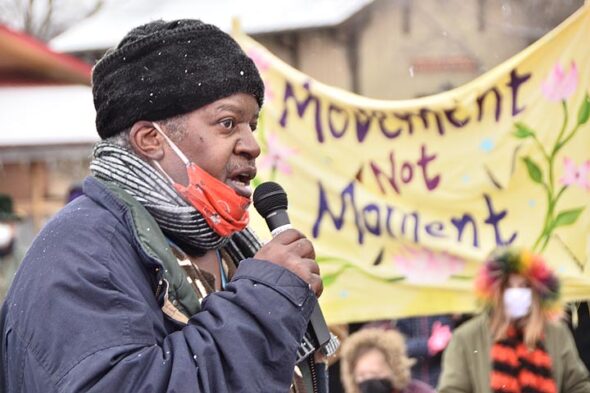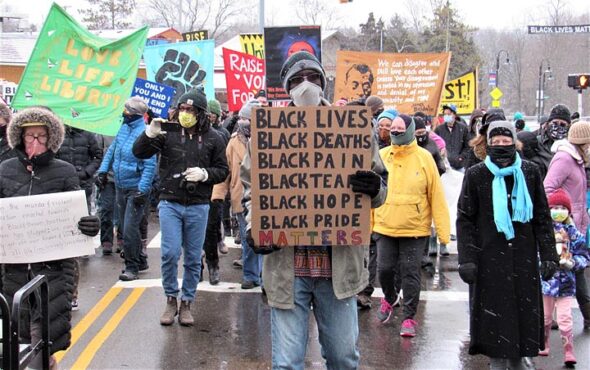
Bomani Moyenda was given the 2021 Martin Luther King Day Community Peacemaker Award on Monday, Jan. 18, during a virtual program which he also emceed. Pictured here, Moyenda, additionally led the annual march. (Photo by Matt Minde)
MLK Day 2021 peacemaker award — Moyenda, a warrior peacemaker
- Published: February 3, 2021
“Three hundred years of humiliation, abuse and deprivation cannot be expected
to find voice in a whisper.”
—Martin Luther King, “Why We Can’t Wait”
Last year, Bomani Moyenda turned down an attempt by the Yellow Springs Martin Luther King Day Planning Committee to give him a Peacemaker Award.
This week he explained to the community that he did so because he was “unable to reconcile” himself as a peacemaker. After all, past recipients have been “real sweet people,” like Andrée Bognar, Willa Dallas, Isabel Newman and Phyllis Jackson.
“[Those are] the kinda people you just want to run up on and hug on,” Moyenda said. “I mean people just don’t do that to me. Some people even cross the street when they see me.”
However, the committee had other ideas. At the virtual MLK Day event held on Monday, Jan. 18, via Zoom, the longtime local activist was finally given the Peacemaker award.
Speaking on the committee’s behalf, villager Locksley Orr reminded the audience of the Martin Luther King quote “peace is not the absence of conflict, but the presence of justice.” Orr spoke further, sharing how the villager is both a warrior and peacemaker.
“[Moyenda is] a man of strong physical stature, who dons a signature ‘no-nonsense’ expression, but his strong persona is much more complex than first impression might suggest,” Orr said. “Through relentless activism, [he] successfully juxtaposes the qualities of a warrior … while maneuvering strategically in the pursuit of justice, demonstrating the art of peace through his nonviolent endeavors.”
“But make no mistake,” Orr added, “his pursuit of justice and peace does not come easily and has not come without opposition, challenges and conflict. And he will readily tell you, ‘no justice, no peace.’”
Read Locksley Orr’s full presentation of the award to Moyenda here
In fact, through this lens, Moyenda does fit the definition of a peacekeeper. In his activism work, his efforts are layered and complex.
A writer and activist, Moyenda was raised in Yellow Springs and graduated from the local high school in 1972. Along with his former wife, he raised four children here. His children and grandchildren now live in other areas of the country. For much of his life, Moyenda has lived in or around Yellow Springs.
Moyenda came into activism early in life, strongly influenced by the civil rights movement, and enhanced by the education he received as a student. In addition to his activism, poetry and work as a case manager for St. Vincent DePaul homeless services in Dayton, Moyenda writes a column for the Yellow Springs News called “Sankofa Talk.”
Moyenda’s advocacy on behalf of the Black Lives Matter movement continues to be robust and ongoing. His volunteer activities have included AACW, the Human Relations Commission, The 365 Project and the Martin Luther King Day Planning Committee.
In 2014, he became active in the Justice for John Crawford movement, an effort to bring justice to Crawford’s family, including his two young sons.
Orr discussed this work in her introduction of Moyenda.
“Acting as an advocate, Bomani took up the charge to fight for 22-year-old John Crawford III, who was killed by police officers while shopping in the Beavercreek Walmart,” she said. “He has continued to advocate for John’s family through … letter-writing campaigns to the courts, marches and rallies. Most recently in August of this past summer, joined by 150 villagers, friends and John Crawford’s father, Bomani led a silent march through downtown Yellow Springs culminating in a sobering memorial and candlelight vigil at Mills Lawn.”
Speaking about the experience in his acceptance speech, Moyenda reflected on the tragic event.
“I can count on my fingers and toes the number of good night’s sleep I’ve had since that incident,” he said of Crawford’s killing. “That atrocity and the systemic racist response to it I believe altered my central nervous system.”
Attempts to hold officers accountable for police brutality and killing more often than not result in police officers going free. But sometimes there are successes. Moyenda has also worked to address the issue of the mass incarceration of Black and brown people.
Last year, he worked with the Greene County Coalition for Compassionate Justice to defeat a proposed jail tax levy that would have funded the $70 million construction of a larger, 500-bed prison in the county. It failed 61–39%.
Though he acknowledges that coalition building is critical on the road to liberation, to Moyenda, activism can also be a lonely and frustrating journey. Stamina and perseverance are often required in the pursuit of justice, he says. People enthusiastic at first often fall to the side as time goes on.
“People will call on me because I have a knack for bringing people together,” Moyenda said. “But the ‘nudgers’ will leave, disappear, get busy after asking for assistance, sometimes without explanation. They lose focus, distracted by other things.”
Activist work in Yellow Springs also requires strong allyship, given the racial demographics of the community in which the majority of people are white.
Asked what makes white people become stronger allies, Moyenda shared, “having some firsthand experience, self-education, mutual empathy — willing to learn, pay attention, get involved.”
The history of youth-driven activism and social justice in the Yellow Springs schools is reflected in Bomani Moyenda’s life. When asked about his legacy, Moyenda cites his educational experience as a catalyst. He mentions teachers, both white and Black, including Joyce McCurdy and the late Larry Ham. They encouraged his movement into activism by providing educational resources for him to study. As a student in the 1960s, Moyenda was also inspired by revolutionary writing, literature and poetry by such authors as Amiri Baraka and Sonia Sanchez.
“We read Frantz Fanon’s ‘The Wretched of the Earth’ when I was a junior in high school,” remembers Moyenda.
As a young student, Moyenda closely followed the development of the Black Panther Party.
“I always had that fire, King’s fierce urgency of now,” he said. Pausing for a moment, he continued, “People lost that urgency. We let the foot up off the gas.”
Moyenda’s emergent activism as a youth occurred early on when he walked out of class during a teacher’s reading of the book “Huckleberry Finn.” The teacher used the “N” word one too many times in his estimation. Saying the word back then didn’t provoke the same response it does now. Yet even at a young age, Moyenda fully understood the hateful implications of its meaning.
“I got up and walked out.”
During a conference with both the teacher and the principal, Moyenda told them there should have been more of a pre-emptive conversation to provide more context for using the word.
“I felt the teacher was a little too eager to use the word under the cover of presenting literature in the class,” he said.
Moyenda continues to foster youth activism in the community, mentoring young people involved in the youth group YS Speaking Up for Justice Wrecking Crew. Known as “Mr. Bomani,” he works with a group of young people from elementary to high school ages. With his guidance and support, they organized socially distanced rallies for 25 straight weeks from May through October 2020. Although on a break this winter from holding rallies and marches, they plan to start again when the weather warms up.
According to Moyenda, “students were worn down with online learning.”
But that doesn’t mean they are on hiatus. Moyenda, working with YS Speaking Up for Justice, and the Yellow Springs News plans to launch a new youth-led newspaper column called “Wrecking Racism.”
“Students will contribute articles to the column. There should be an introductory column coming in the next few weeks,” he explained.
Moyenda finds other ways for people to participate in the pursuit of justice work through writing. Similar to the revolutionary writings of the 1960s that inspired him, he utilizes writing to bring attention to important social issues.
A gifted poet, he organized poetry readings pre-COVID at the Emporium and other places and utilizes his own work to motivate people to get involved in justice movements.
“I use that [poetry readings] as an outlet to get others involved,” he said.
Moyenda has also delved into playwriting, creating a play called “What’s Done in the Dark.”
“It imagines the behind-the-scenes conversations that legal people get into when cops kill people, discussions and motivations for not prosecuting, making sure no justice will occur,” he said of the play.
2021 MLK Day

Martin Luther King Jr. Day was celebrated this year, as it always is, with a march through downtown followed by a spirited program. In this pandemic year, however, marchers wore masks, and gathered virtually for the annual program. Above, Cyprian Sajabi shared his message about what really matters. (Photo by Malaya Booth)
The virtual Martin Luther King Day celebration, in which Moyenda was honored, began with a drumming circle. The program was framed by the theme “Where Do We Go From Here: Hope and Expectation.” In response to the theme, students from the elementary, middle and high schools presented essays filled with serious and urgent concerns related to recent insurrection attempts, and the fight against racism often led by the Black Lives Matter Movement. The essays were striking in their somber tone as students expressed an astute understanding of what is at stake for their generation right now.
Poetry was read by Antioch College student Alexis McGilvery, Yellow Springs High School student Arielle Johnson and celebrated Dayton area poet Sierra Leone. The World House Choir creatively utilized technology to safely record and perform the uplifting gospel hymn “I Shall Not Be Moved” and the transformative cantata “All Lifted Hearts are Free.” Excerpts from King’s recorded 1967 speech “Where Do We Go From Here” were played during the program.
YS Speaking Up for Justice also worked with the Yellow Springs Martin Luther King Day Celebration Committee to organize the annual Martin Luther King Day Celebration march that preceded the awards program.
The march began with a community call, to gather with African drums. Moyenda, along with YS Speaking Up for Justice students, led an estimated 200 marchers through downtown, pausing midway as Billie Holiday’s song “Strange Fruit” played in remembrance of the lives lost to violent racist attacks. When the crowd returned to the starting point, the march ended with celebratory music in honor of King’s life, and attendees danced to the track “Black or White” by Michael Jackson.
Citing COVID-19-related concerns, much of the program was pre-recorded and was presented virtually via media platforms including Zoom, local community access channel 5 and livestreamed by Antioch College. The program is available for viewing on YouTube under “Virtual Yellow Springs Martin Luther King Day Program 2021.”
The Yellow Springs News encourages respectful discussion of this article.
You must login to post a comment.
Don't have a login? Register for a free YSNews.com account.











No comments yet for this article.